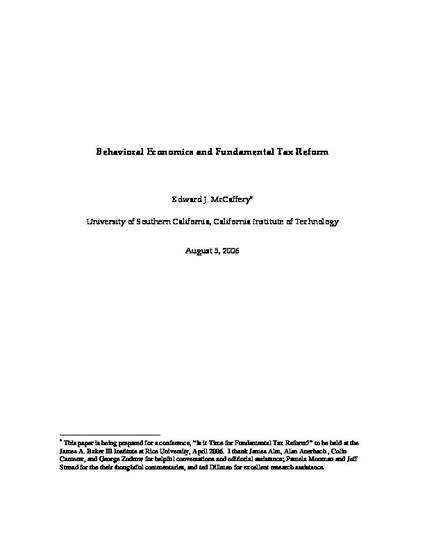
Unpublished Paper
Behavioral Economics and Fundamental Tax Reform
University of Southern California Law and Economics Working Paper Series
Abstract
The most common use of the insights of behavioral economics in the cause of fundamental tax reform has been to argue for the employment of ad hoc tax-favored savings vehicles—such as individual retirement accounts (IRAs), medical, and educational savings accounts, and so on—within an income-tax framework. There is no reason under a “rational” life-cycle model of individual savings behavior why these ad hoc vehicles should work, to increase savings on the micro (individual) or macro (collective social) levels, whether they follow the “postpaid” approach of traditional IRAs or the “prepaid” approach of Roth IRAs. Prepaid accounts generate a windfall gain to existing savers, and offer no cash-flow relief for current non-savers to help them save. Postpaid accounts can be easily “arbitraged” by borrowing, or dissaving. Proponents of these plans thus point to lessons from behavioral economics, arguing that myopic individuals who use “mental accounts” might be led to save by the special vehicles. This essay takes exception to this standard view. It argues that this view of matters misconceives basic principles of behavioral economics, using ad hoc findings in an ad hoc fashion to justify ad hoc, incremental reform. Best understood, behavioral economics suggests that ad hoc tax favored plans will not work. This counter-theory is supported by the data, which show, broadly, decades of ad hoc tax-favored vehicles within the Internal Revenue Code, with more apparently on the way, matched by convincing evidence of little or no savings by most Americans, and little savings in the aggregate. The essay concludes by suggesting that a happier, more stable marriage of behavioral economics and fundamental tax reform suggests fundamental, not incremental, reform of the tax system.
Disciplines
Date of this Version
8-7-2006
Citation Information
Edward J McCaffery. "Behavioral Economics and Fundamental Tax Reform" (2006) Available at: http://works.bepress.com/edward_mccaffery/3/
